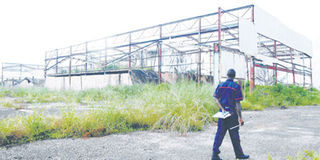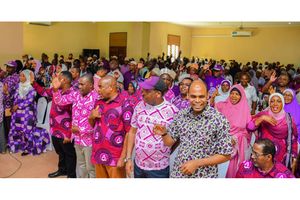Privatised industries in the list of government’s little black book

Since Morogoro Shoes Limited caught fire in 1997 it has remained dilapidated and bushy. PHOTOS | The citizen correspondent
What you need to know:
When most of these companies were sold to private players many years ago, the idea was to give them a new lease of life and create jobs for millions of the country’s youth, and contribute to the national economy. But most of them have immensely disappointed.
Dar es Salaam. For years, there has been more talk than action on the need to repossess redundant and non-performing industries. There are 274 state firms that had been privatised by 2012, according to official figures.
It proved to be a thorny issue in the 10 years of former President Jakaya Kikwete’s administration. Somehow, it still is.
According to a 2013 report by the now defunct Consolidated Holding Corporation (CHC), which audited 170 of the privatised firms, only 42 were making profit, while 70 were loss-making and the other 58 not operating at all.
The CHC was tasked with overseeing the privitisation after inheriting the work from the Parastatal Sector reform Commission (PSRC) in 1997.
We take a look at some of the industries that were in the government’s little black book:
1. Mang’ula Mechanical and Machine Tools Limited (MMMT) (Morogoro)
It was privatised to St Mary’s Schools on February 27, 2007 at a cost of Sh600million. Not fully paid for. Outstanding balance at Sh230million minus interest.
Initial status:
Operated a foundry go-down, forging fabrication, heat treatment and carpentry; prefabricated concrete manufacturing plant (PCM), which had nine go-downs; administration buildings, including dormitories and three hospital buildings.
Current status:
Despite the fact that the company could have survived for another 100 years, it was found in a rundown condition with a large part of the building neglected to a bushy forest of overgrown grass and tall trees, with most of its machines either sold or melted, and used as raw materials.
75 workers on a temporary three-month contract that was never renewed. MMMT had declared that all the employees had permanent contracts.
Investor’s details:
On June 4, 2011, the investor told the committee of a new plan to revive the business by turning it into a polytechnic college. The investor had a history of investing in non-technical schools. There was also no evidence of goodwill to develop the industry.
Recommendations:
The government was advised to issue a 30-day notice of its intention to terminate the investor’s contract for breach of contract. It would also assess the current value of the property against its original value.
The government was advised to claim compensation for all the missing assets and start the process of finding another investor with the commitment and capacity to revive the company.
2. Mwanza Tanneries Limited (Mwanza)
Privatised on March 9, 1993, in a joint venture between the initial owner, Tanzania Leather Associated Industries (40 per cent) and African Trade Development Ltd (60 per cent).
According to the contract agreement, a total of Sh350 million was to be invested in rehabilitation and capital.
Current status:
The joint company was never formed, neither was its name in the partnership agreement. Privatisation remained a dream. The investor breached the contract. The Sh350 million capital investment remained but a promise.
The facility was neglected, with machinery unattended and poisonous substances leaking inside the industry. Only 20 employees are left as security guards and manual labourers. The area has been turned into a parking lot and store for mining Services Company, Caspian Limited and lately Vodacom.
Recommendations:
The investor has no shown any interest to revive the tannery. The government should terminate the contract and also require the investor to immediately pay for damage and compensation for to the buildings and machinery destroyed. The investor should also pay rentals for the period the company was in charge. The committee advised the government to immediately find another investor for the leather processing firm.
3. Morogoro Shoes Limited (Morogoro)
Privatised at a time the company had become insolvent in 1992. The investor, Guled Shoe Co. Ltd, continued with production but in 1997, the company caught fire. Production was stopped, leaving the factory dilapidated and bushy. Meanwhile, a section of the building was being used to shelter Abood buses.
Recommendations:
The government, like in the other cases, was advised to reacquire the firm.
4. Morogoro Ceramics Ltd
Factory plants and machinery privatised to Pure Bond Limited in 1993 at a cost of Sh452 million, which was fully paid.
However, the contract of sale was never found after that. Curiously, the investor was permitted to transfer the machinery to another industry in Nigeria as per contractual agreement.
Current status:
The factory is run down, the buildings neglected. There is no trace of the privatisation documents and when questioned, the investor admitted he purchased the industry for purposes of exporting the machinery to Nigeria. He was not interested in the buildings.
Recommendation:
The government was advised to discuss the matter with the Tanzania Investment Bank (TIB) to identify the actual owner of the building, and find alternative use for the industry.
5. Polysacks Company Ltd (BAGCO Ltd) (Dar es Salaam)
Privatised to Purebond Limited in 1998 at a cost of Sh100 million upon agreeing that the investor would revive the company’s plants and machinery to develop and expand the factory.
Current status:
Buildings still in good condition though the factory has not been operating. However, machinery was sold as scrap metal. A few remaining items have been stored in one room. The buildings are currently being used as a storage facility for salt produced by Kensalt Company Limited.
Findings:
The investor has shown no effort to revitalise the industry, and has been giving lame excuses citing his failure to secure a loan facility to drive his expansion plan. Instead, he turned the factory into a storage facility against the government’s privatisation plan.
Recommendations:
Government was advised to issue a 60-day notice for the termination of the contract.
6. Ubungo Garments Limited (Dar es Salaam)
The factory was sold to VMB Holdings in 1998 at a cost of Sh150 million. The investor agreed to develop and expand the industry.
So far, only Sh58 million, equivalent to 40 per cent of the total has been paid.
Current status:
The building is in a bad state. When or if production resumes, major rehabilitation will be required. Machinery overused.
The investor did not develop the factory because the government failed to give him ownership documentation as per agreement.
Recommendations:
The committee found that both parties, the government and investor, had failed to meet the conditions set in the contract. The government was advised to issue the title deeds, and demand that the investor meets his end of bargain.
7. Kilimanjaro Textile Mills Ltd (Arusha)
The factory was sold through liquidation in 1994 to the Tanzania Audit Corporation, which sustained production until 2007. A total of 750 employees were all retrenched and paid their terminal benefits. They were promised to be recalled after three months. That did not happen.
Current status:
Equipment comprising spinning, weaving and colour transfusion machines was removed and stored at the Tanzania Bag Mill II company in Moshi.
The buildings are still in good condition although they have been leased out to Mohamed Enterprises Ltd, and now used as a maize storage facility.
Findings:
The investor has shown no interest in revitalising the industry because the machinery has been taken out, and buildings used as a storage facility.
Recommendations:
The government advised to discuss with the investor to find out his alternative investment plan for the industry.
8. Tanzania Bag Corporation Ltd (Kilimanjaro)
Factory sold through an asset sale agreement to TPM (1998) Limited at a cost of Sh300 million on February 18, 1999. The contract did not highlight the investment plan and there was no section that showed termination and repossession of the factory in case he failed to meet the conditions of the contract.
Current status:
No operations since the industry was privatised in 1999. Machinery taken out of the factory. Investor claimed machinery was outdated and not good enough for production. The company currently has only four employees working as security officers. The majority were retrenched and paid their terminal benefits.
In June 2011, the investor informed the committee he had failed to invest in the factory because of the influx of cheap imports. He said he communicated his grievances to the Ministry of Industry and Trade seeking an order to have coffee, cashew nut and cereal industries to purchase local sacks and a create market for them. But nothing has changed. He promised to commence production in December 2011 if he was assured of a market for local sacks.
Findings:
The investor made no effort to develop the factory. He took the machinery out of the buildings, and showed no plan for product diversification.
Recommendations:
The government was advised to order the investor submit his investment plan within six months and to do monitoring of his activities annually to ensure he was implementing the plans.
9. Nyanza Engineering and Foundry Company
Privatised by the Presidential Parastatal Sector Reform Commission (PSRC) in 1998 to Nyanza Cooperative Union (1984) Ltd at a cost of Sh100 million. Investor made a down payment of Sh40 million.
He was required to develop and expand the factory without changing or selling company resources, which included mechanical, foundry and pattern workshop.
Current status:
Dilapidated and not operating since 1999. A section of the mechanical and pattern workshop had been taken out and stored in one place. The investor leased a section of the building to M/S Seif and Guled Distributors.
In 2005, the court ordered the sale of pattern workshop after the investor failed to pay his lawyer a sum of Sh60 million. The factory has had no workers since it was shut down in 1999.
Findings:
Investor had no plan to revitalise the factory.
Recommendations:
Government advised to issue a 60-day notice of its intention to terminate the contract for breach of agreement. The investor was to purchase the pattern workshop sold against contractual agreement. While the government has the right to claim for general damages, it was advised to negotiate with the investor for reimbursement of funds equivalent to his investments and his tax contribution since he became the owner of the company. In addition, the government should find another investor able to revive and develop the industry.
10. Steel Rolling Mills (Tanga)
Privatised at a cost of $1.57 million through liquidation to MS Unique Group Ltd. But until 2006, the investor had paid $1.06845 million. The factory, however, produced iron, nails, wire mesh, bolts and nuts for three months only after privatisation.
The investor claimed he had purchased a heating and melting furnace at a cost of $4.0 million but failed to continue production due to lack of raw materials, including scrap metal, which is currently illegally exported. Importation of scrap metal, he said, was expensive.
Recommendations:
The government advised to order the investor to pay up the remaining $501,550, which should have been paid since 2006. Failure to do so, the government should immediately file a civil case against him. The government should also demand the investor’s action plan for the next six months, and monitor his activities annually to find out whether or not he was implementing the plan.
11. Zana Za Kilimo (ZZK) Mbeya
Privatised by way of liquidation to CMG Investment Ltd on October 17, 2002 at a cost of Sh375 million. The money was fully paid.
Current status:
Buildings are dilapidated. Administration building windows and roof have been removed. Some structures now used as a depot for Serengeti Breweries Ltd. Small-scale production taking place depending on the needs of individual customers.
Recommendations:
The government advised to find out the investor’s new investment plan and monitor him annually to ensure they are implemented.
12. Mbeya Ceramics Company Ltd (Mbeya)
Privatised by PSRC to Kyela Valley Food Ltd on August 31, 1995 at a cost of Sh200 million. The deal was for the investor to develop and expand production. A down payment of Sh75 million, equivalent (37.5 per cent) was to be paid on signing MoU, and another Sh37.5 million on signing of the contract of sale. Investor did not meet the conditions.
Current status:
Investor neglected the factory and was not producing anything. The buildings were taken over by small businesspeople, who erected shops within.
Investor claims:
A study showed industry was not built for large but small production, which can only meet the needs of training activities.
Findings:
Investor had failed to develop the industry, 16 years after taking over.
Recommendations:
The government advised to issue a 30-day notice of intention to terminate the contract due to breach of contract and terminate it according to section 17.1 and 17.2 of the contract of sale.
12. Mbeya Textile Mill Ltd (Mbeya)
Privatised to New Mbeya Textile Mill Ltd on June 16, 1999 at a cost of $818,462. According to section 9.1 of the contract of sale, the investor was required to invest a total of $4.5million in a period of five years.
Current status:
Building dilapidated and machinery not working after years of neglect. Production stopped in 2011 due to lack of raw materials (cotton) from Chunya District. Only 20 temporary workers at the factory when the committee arrived. Machinery reportedly removed to another site.
Recommendations:
Government advised to take over production of cotton, and order the investor to stop removing machinery from the factory. To also submit alternative investment plans in three months.




